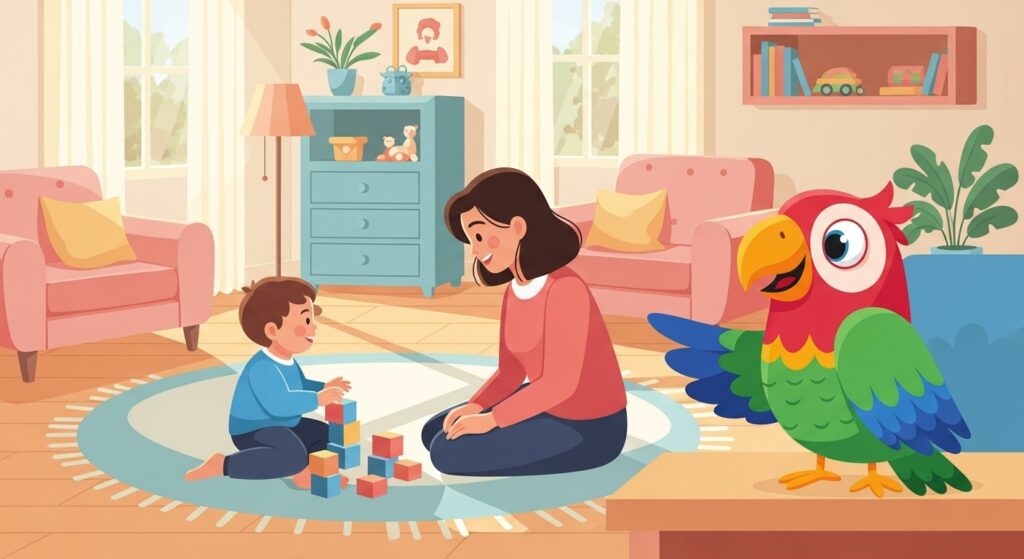As a parent, you naturally want to see your toddler thrive, especially when it comes to early communication and language skills. Toddlers between the ages of one and four experience remarkable language milestones, and engaging them at home can significantly support their speech and language development. Here are ten fun, simple, and practical activities you can effortlessly incorporate into your daily routine to enhance your toddler’s language growth.
1. Storytime Adventures: Reading with Toddlers
Regularly reading with toddlers is one of the simplest yet most powerful ways to encourage language growth. Choose colorful books with repetitive phrases, rhymes, and familiar topics. Encourage your child to participate by asking simple questions like, “What’s that?” or “What do you think happens next?” This fosters interaction and boosts vocabulary.
Tip: Use expressive voices and sounds to make reading sessions lively and engaging.
2. Play Pretend and Role-Play
Role-play games offer endless possibilities to enhance toddler speech. Pretending to cook, shop, or care for dolls encourages conversation and expands vocabulary naturally. For instance, pretend grocery shopping allows toddlers to practice naming fruits, vegetables, or common items, stimulating their expressive language.
Tip: Provide costumes or props to make pretend play more interactive and exciting.
3. Sing Along and Rhyme
Songs and nursery rhymes aren’t just entertaining; they significantly aid in speech development. Music naturally captures children’s attention, and rhymes build phonological awareness. Choose songs with simple, repetitive lyrics that toddlers can easily memorize and repeat.
Tip: Incorporate simple hand movements or dance to enhance engagement.
4. Interactive Nature Walks
Exploring outdoors presents numerous opportunities for language learning. Label everything you see, from birds to leaves, rocks, and clouds. Engage your toddler by asking questions and encouraging descriptive words like “big tree” or “blue flower.”
Tip: Collect small items like leaves or sticks and talk about their colors, shapes, and textures.
5. Simple Cooking Together
Cooking activities provide an enjoyable way to introduce new vocabulary related to food, utensils, and simple actions like stir, pour, or mix. Even making a simple snack together, like fruit salad or sandwiches, encourages conversation and cooperation.
Tip: Clearly name each ingredient and action to reinforce new words.
6. Daily Narrations and Conversations
Regularly describing daily activities provides continuous language exposure. Narrate your actions throughout the day, such as, “Mommy is washing dishes,” or “We’re putting shoes on.” Encourage toddlers to imitate and repeat after you, building their vocabulary and sentence structures.
Tip: Keep conversations simple and clear to maintain engagement and understanding.
7. Play Games with Repetition and Imitation
Games like peek-a-boo or Simon Says are fantastic for enhancing toddler speech through repetition and imitation. Repetitive phrases and actions help toddlers anticipate what comes next, encouraging them to verbalize and mimic words.
Tip: Celebrate enthusiastically when your toddler joins in, fostering confidence in speaking.
8. Sensory and Messy Play
Messy activities like finger painting, sand play, or playing with dough encourage descriptive language. As toddlers explore different textures, colors, and sensations, encourage them to describe what they feel and see, such as “soft,” “sticky,” or “cold.”
Tip: Prepare an easy-to-clean space where your child can explore freely and without stress.
9. Family Photo Talks
Looking at family photos together is a warm and engaging way to stimulate conversation and language skills. Discuss who is in each photo, what they are doing, and recall fond memories. This encourages toddlers to express themselves and develop storytelling abilities.
Tip: Create a simple photo album just for your toddler to explore independently or with you.
10. Interactive Screen Time with Caution
While excessive screen time is linked to speech delays and Virtual Autism, mindful and limited interactive screen experiences can occasionally complement language learning. Choose high-quality, educational programs that invite your toddler to respond verbally.
Tip: Always accompany your toddler during screen time, discussing content actively to enhance its educational value.
Keeping Language Fun and Pressure-Free
Remember, language learning should be fun and stress-free. Celebrate each small step your toddler takes toward clearer communication and encourage without pressure. Each child develops at their own pace, so patience and consistency are key.
If you’re looking for more structured yet playful ways to address speech delays or enhance early communication, try out the Tiny Talkers app. Using a play-based methodology designed specifically for toddlers, Tiny Talkers provides interactive activities that are not only engaging but also expertly crafted to boost language skills in a joyful, natural way.
Give your toddler the best possible start by integrating these enjoyable language activities into your daily life. Happy talking!

